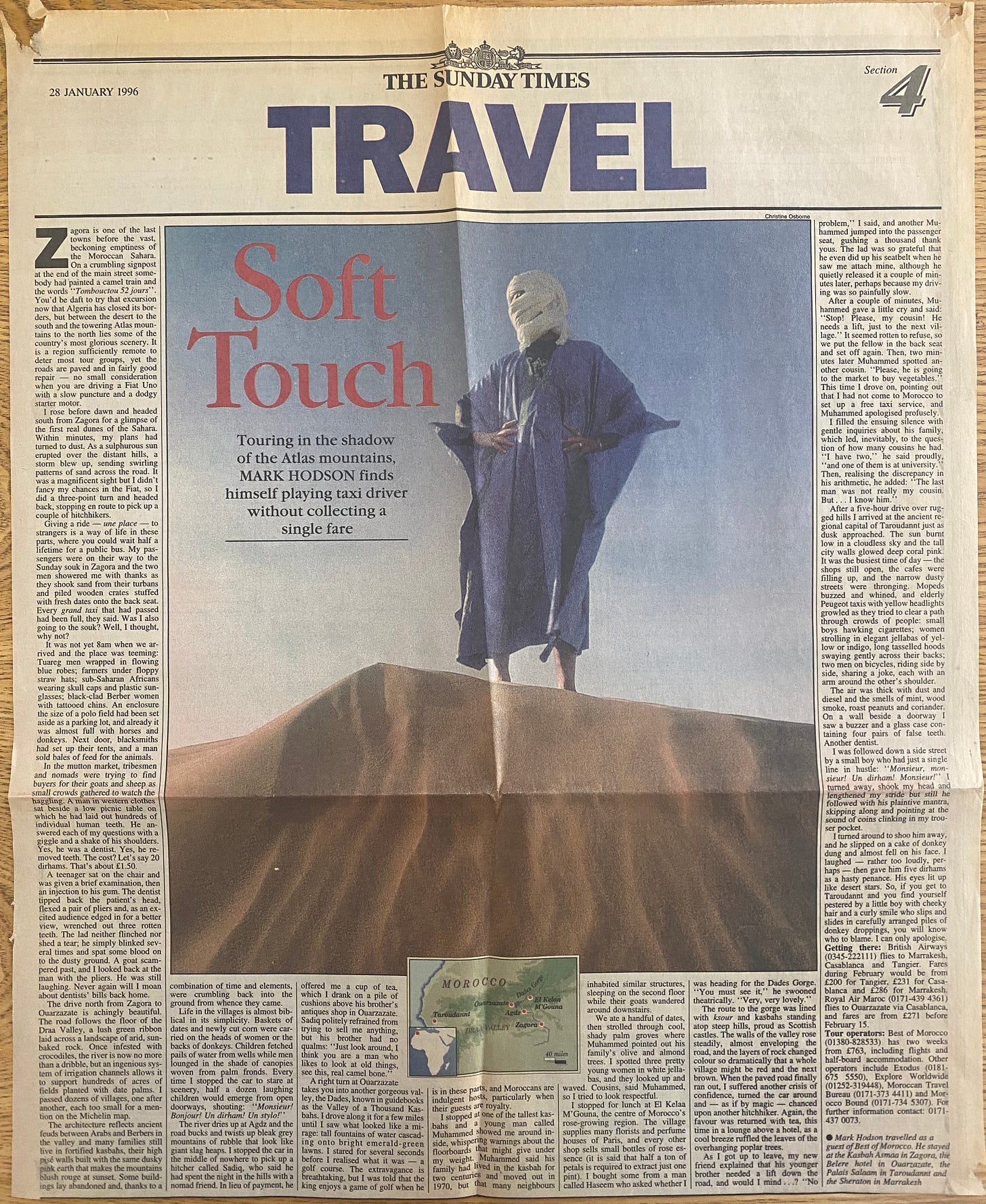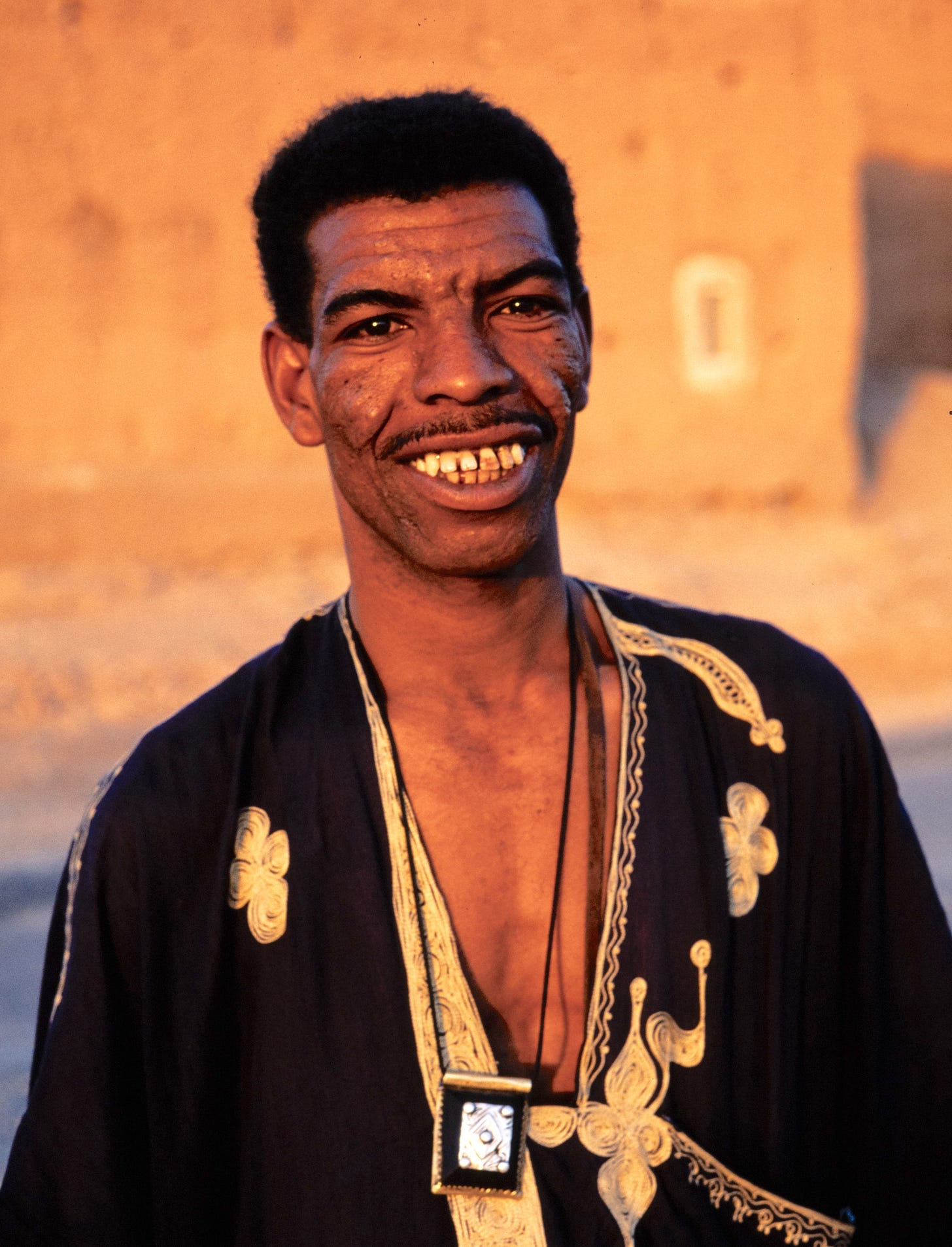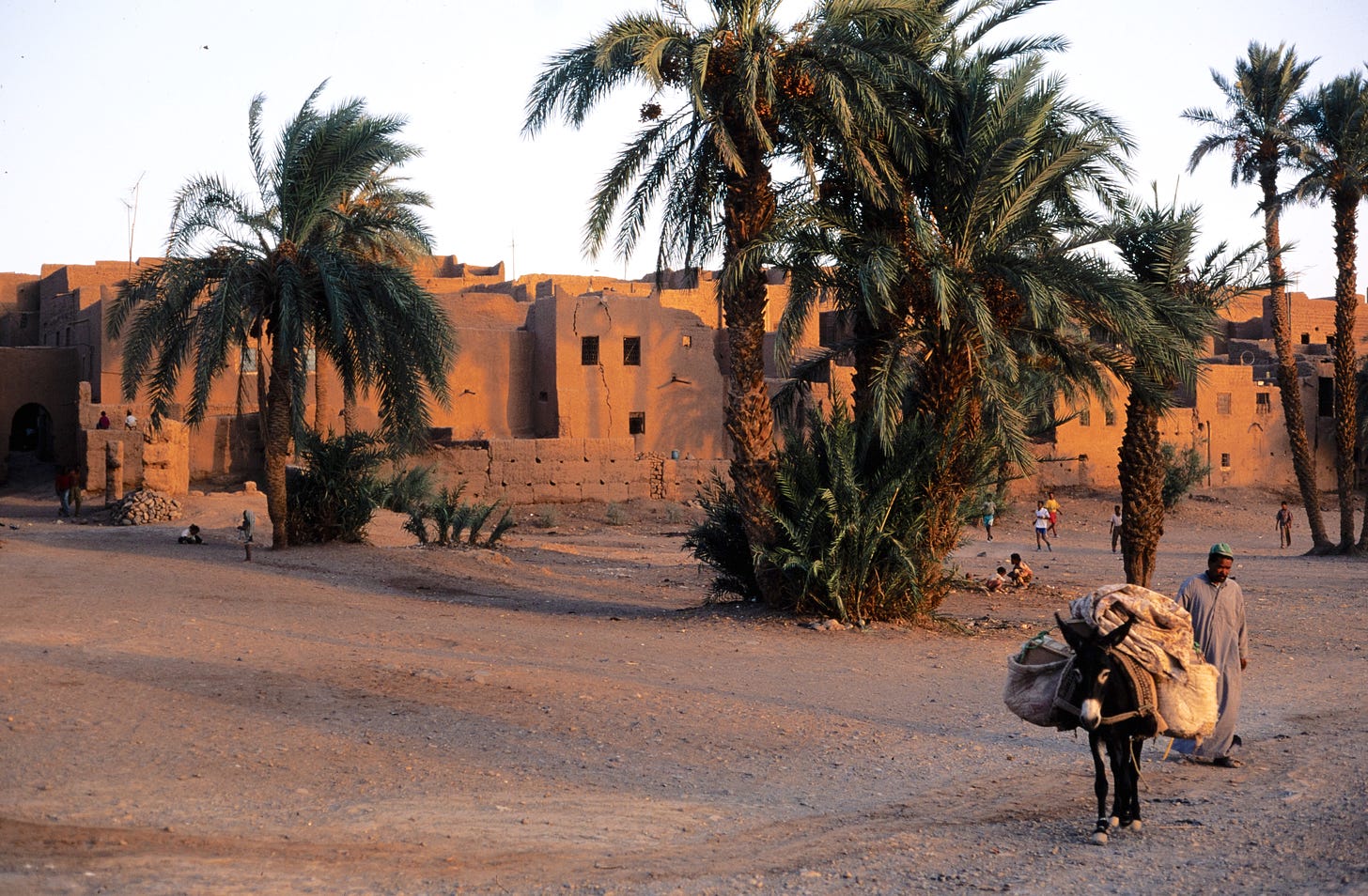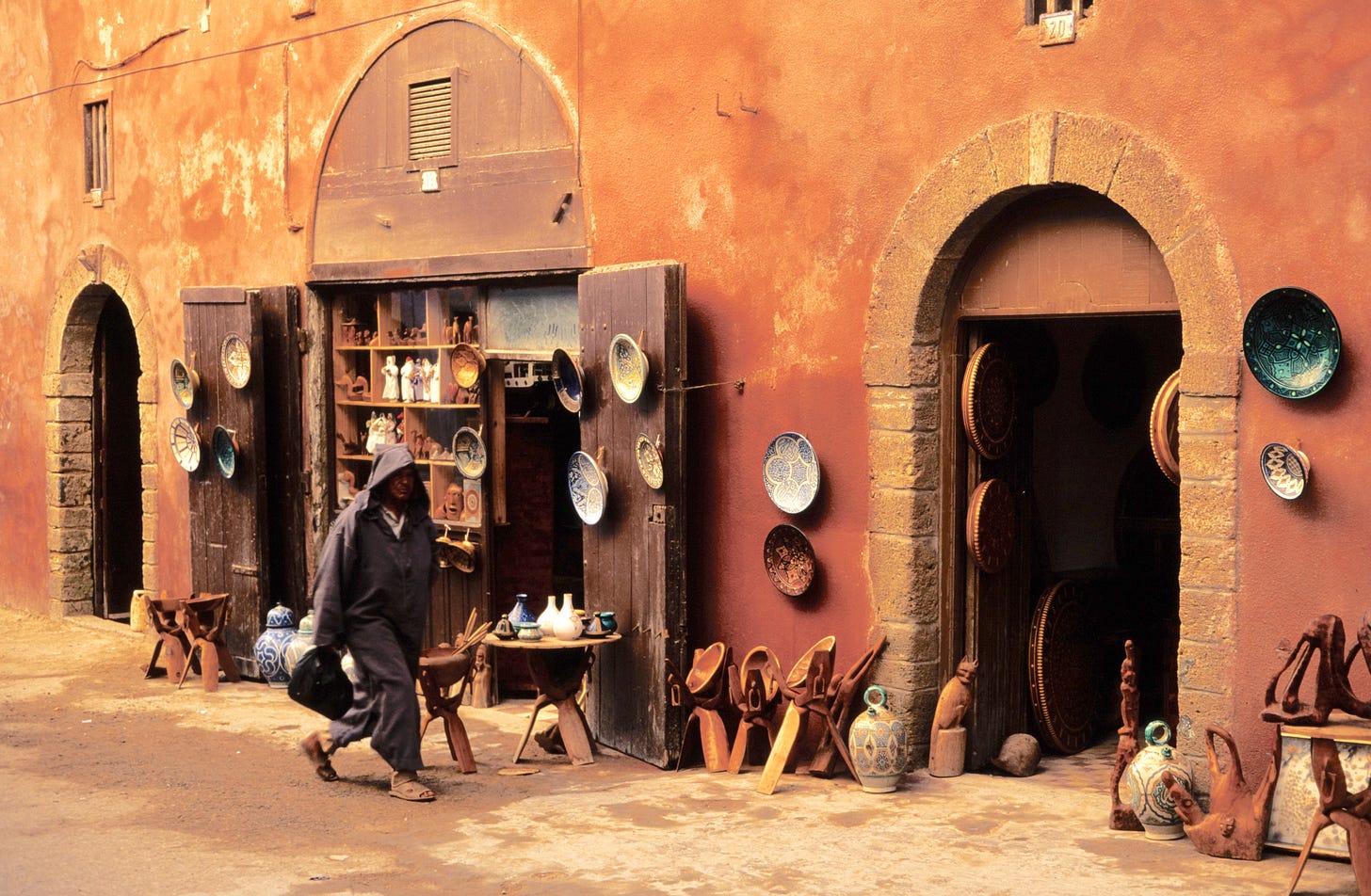Taken for a ride
In 1995, I pitched a story to The Sunday Times: I would drive around the south of Morocco in a rental car, picking up hitchhikers as a way to meet local people. This is the resulting article.
Zagora is one of the last towns before the vast, beckoning emptiness of the Moroccan Sahara. On a crumbling signpost at the end of the main street somebody had painted a camel train and the words “Tombouctou 52 jours”.
You'd be daft to try that excursion now that Algeria has closed its borders, but between the desert to the south and the towering Atlas mountains to the north lies some of the country's most glorious scenery. It is a region sufficiently remote to deter most tour groups, yet the roads are paved and in fairly good repair - no small consideration when you are driving a Fiat Uno with a slow puncture and a dodgy starter motor.
I rose before dawn and headed south from Zagora for a glimpse of the first real dunes of the Sahara. Within minutes, my plans had turned to dust. As a sulphurous sun erupted over the distant hills, a storm blew up, sending swirling patterns of sand across the road. It was a magnificent sight but I didn't fancy my chances in the Fiat, so I did a three-point turn and headed back, stopping en route to pick up a couple of hitchhikers.
Giving a ride - une place - to strangers is a way of life in these parts, where you could wait half a lifetime for a public bus. My passengers were on their way to the Sunday souk in Zagora and the two men showered me with thanks as they shook sand from their turbans and piled wooden crates stuffed with fresh dates onto the back seat. Every grand taxi that had passed had been full, they said. Was I also going to the souk? Well, I thought, why not?
It was not yet 8am when we arrived and the place was teeming: Tuareg men wrapped in flowing blue robes; farmers under floppy straw hats; sub-Saharan Africans wearing skull caps and plastic sunglasses; black-clad Berber women with tattooed chins. An enclosure the size of a polo field had been set aside as a parking lot, and already it was almost full with horses and donkeys.
Next door, blacksmiths had set up their tents, and a man sold bales of feed for the animals. In the mutton market, tribesmen and nomads were trying to find buyers for their goats and sheep as small crowds gathered to watch the haggling. A man in western clothes sat beside a low picnic table on which he had laid out hundreds of individual human teeth. He answered each of my questions with a giggle and a shake of his shoulders. Yes, he was a dentist. Yes, he removed teeth. The cost? Let's say 20 dirhams. That's about £1.50.
A teenager sat on the chair and was given a brief examination, then an injection to his gum. The dentist tipped back the patient's head, flexed a pair of pliers and, as an excited audience edged in for a better view, wrenched out three rotten teeth. The lad neither flinched nor shed a tear; he simply blinked several times and spat some blood on to the dusty ground. A goat scampered past, and I looked back at the man with the pliers. He was still laughing. Never again will I moan about dentists' bills back home.
The drive north from Zagora to Ouarzazate is achingly beautiful. The road follows the floor of the Draa Valley, a lush green ribbon laid across a landscape of arid, sun-baked rock. Once infested with crocodiles, the river is now no more than a dribble, but an ingenious system of irrigation channels allows it to support hundreds of acres of fields planted with date palms.
I passed dozens of villages, one after another, each too small for a mention on the Michelin map. The architecture reflects ancient feuds between Arabs and Berbers in the valley and many families still live in fortified kasbahs, their high pise walls built with the same dusky pink earth that makes the mountains blush rouge at sunset. Some buildings lay abandoned and, thanks to a combination of time and elements, were crumbling back into the ground from whence they came.
Life in the villages is almost biblical in its simplicity. Baskets of dates and newly-cut corn were carried on the heads of women or the backs of donkeys. Children fetched pails of water from wells while men lounged in the shade of canopies woven from palm fronds. Every time I stopped the car to stare at scenery, half a dozen laughing children would emerge from open doorways, shouting: “Monsieur! Bonjour! Un dirham! Un stylo!”
The river dries up at Agdz and the road bucks and twists up bleak grey mountains of rubble that look like giant slag heaps. I stopped the car in the middle of nowhere to pick up a hitcher called Sadiq, who said he had spent the night in the hills with a nomad. In lieu of payment, he offered me a cup of tea which I drank on a pile of cushions above his brother's antiques shop in Ouarzazate.
Sadig politely refrained from trying to sell me anything, but his brother had no qualms: “Just look around, I think you are a man who likes to look at old things, see this, real camel bone.”
A right turn at Ouarzazate takes you into another gorgeous valley, the Dades, known in guidebooks as the Valley of a Thousand Kasbahs. I drove along it for a few miles until I saw what looked like a mirage: tall fountains of water cascading onto bright emerald-green lawns. I stared for several seconds before I realised what it was - a golf course. The extravagance is breathtaking, but I was told the king enjoys a game of golf when he is in these parts and Moroccans are indulgent hosts, particularly when their guests are royalty.
I stopped at one of the tallest kasbahs and a young man called Muhammed showed me around inside, whispering warnings about the floorboards that might give way under my weight. Muhammed said his family had lived in the kasbah for two centuries and moved out in the 1970s, but that many neighbours still inhabited similar structures, sleeping on the second floor while their goats wandered around downstairs.
We ate a handful of dates, then strolled through cool, shady palm groves where Muhammed pointed out his family's olive and almond trees. I spotted three pretty young women in white jellabas, and they looked up and waved. Cousins, said Muhammed, so I tried to look respectful.
I stopped for lunch at El Kelaa M’Gouna, the centre of Morocco's rose-growing region. The village supplies many florists and perfume houses of Paris, and every other shop sells small bottles of rose essence (it is said that half a ton of petals is required to extract just one pint). I bought some from a man called Haseem who asked whether I was heading for the Dades Gorge. “You must see it,” he swooned theatrically. “Very, very lovely.”
The route to the gorge was lined with ksour and kasbahs standing atop steep hills. The walls of the valley rose steadily, almost enveloping the road, and the layers of rock changed colour so dramatically that a whole village might be red and the next brown. When the paved road finally ran out, I suffered another crisis of confidence, turned the car around and - as if by magic - chanced upon another hitchhiker. Again, the favour was returned with tea, this time in a lounge above a hotel, as a cool breeze ruffled the leaves of the overhanging poplar trees.
As I got up to leave, my new friend explained that his younger brother needed a lift down the road, and would I mind …? “No problem,” I said, and another Muhammed jumped into the passenger seat, gushing a thousand thank-yous.
The lad was so grateful that he even did up his seatbelt when he saw me attach mine, although he quietly released it a couple of minutes later, perhaps because my driving was so painfully slow.
After a couple of minutes, Muhammed gave a little cry and said: “Stop! Please, my cousin! He needs a lift, just to the next village.” It seemed rotten to refuse, so we put the fellow in the back seat and set off again. Then, two minutes later Muhammed spotted another cousin. “Please, he is going to the market to buy vegetables.” This time I drove on, pointing out that I had not come to Morocco to set up a free taxi service, and Muhammed apologised profusely.
I filled the ensuing silence with gentle inquiries about his family, which led, inevitably, to the question of how many cousins he had. “I have two,” he said proudly, “and one of them is at university.” Then, realising the discrepancy in his arithmetic, he added: “The last man was not really my cousin. But I know him.”
After a five-hour drive over rugged hills I arrived at the ancient regional capital of Taroudant just as dusk approached. The sun burned low in a cloudless sky and the tall city walls glowed deep coral pink. It was the busiest time of day - the shops still open, the cafes were filling up, and the narrow dusty streets were thronging. Mopeds buzzed and whined, and elderly Peugeot taxis with yellow headlights growled as they tried to clear a path through crowds of people: small boys hawking cigarettes; women strolling in elegant jellabas of yellow or indigo, long tasselled hoods swaying gently across their backs; two men on bicycles, riding side by side, sharing a joke, each with an arm around the other's shoulder.
The air was thick with dust and diesel and the smells of mint, wood smoke, roast peanuts and coriander. On a wall beside a doorway I saw a buzzer and a glass case containing four pairs of false teeth. Another dentist.
I was followed down a side street by a small boy who had just a single line in hustle: “Monsieur, monsieur! Un dirham! Monsieur!” I turned away, shook my head and lengthened my stride but still he followed with his plaintive mantra, skipping along and pointing at the sound of coins clinking in my trouser pocket.
I turned around to shoo him away, and he slipped on a cake of donkey dung and almost fell on his face. I laughed - rather too loudly, perhaps - then gave him five dirhams as a hasty penance. His eyes lit up like desert stars. So, if you get to Taroudant and you find yourself pestered by a little boy with cheeky hair and a curly smile who slips and slides in carefully-arranged piles of donkey droppings, you will know who to blame. I can only apologise.
Originally published in The Sunday Times, London. Copyright: Mark Hodson 1996. This is the first time the article has appeared online. I removed one four-word phrase, which I found horribly gauche, but otherwise it’s unchanged.






